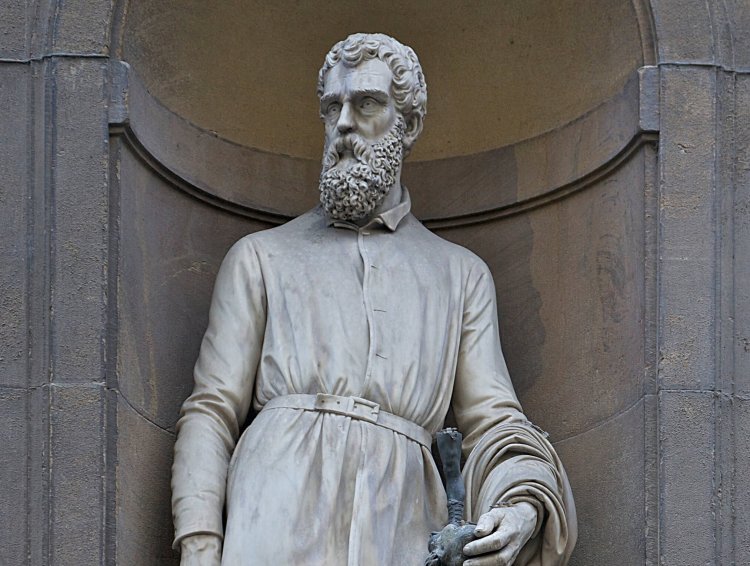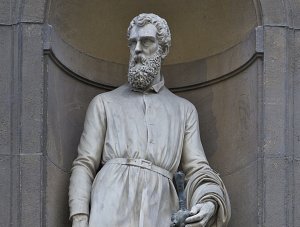Goldsmith, Poet, Musician
On February 13, 1571, 451 years ago, a restless and eccentric goldsmith and sculptor, one of the greatest artists of the Renaissance died in Florence, where he was born November 3, 1500: Benvenuto Cellini. Here we are with another of […] The post Goldsmith, Poet, Musician appeared first on OnePeterFive.


On February 13, 1571, 451 years ago, a restless and eccentric goldsmith and sculptor, one of the greatest artists of the Renaissance died in Florence, where he was born November 3, 1500: Benvenuto Cellini. Here we are with another of the ranks of those very high minds who have been able to draw the most sublime inspirations of art from Catholic sentiment.
In The Life of Benvenuto Cellini written by himself, which, between 1558 and 1565, he dictated to his apprentice Michele di Goro, we find his adventurous existence, a fresco of the Italian and French society of the time and, in the exasperated protagonist’s egocentricity, the well-known Renaissance conflict between virtue and fortune. Passing through the courts of Duke Cosimo I de’ Medici in Florence, Pope Clement VII in Rome, the Viceroy of Naples and King Francis I in Paris, Benvenuto soon became famous above all in his goldsmith and chisel works. These include the most illustrious Salt Cellar in history (1543), created for the King of France, and Perseus, a large bronze statue for the Loggia dei Lanzi in Florence, inaugurated in April 1554.
The name of Benvenuto Cellini — protagonist, among other things, of the operas Benvenuto Cellini, composed by Hector Berlioz between 1834 and 1838, and Ascanio, written by Camille Saint-Saëns between 1887 and 1888 — is mostly remembered as the progenitor of Italian Mannerism (Late Renaissance) and hardened multiple murderer, the “cursed Florentine.” Few, however, know Cellini as a musician and poet.
He was initiated into music by his father, Giovanni, who, in addition to being an “engineer,” “learned to play most excellently on the viol and the flute” so much so that he was a member of the fifes of Florence for thirty-six years, serving first the Medici and then the Florentine Republic, and “fashioned wonderful organs with pipes of wood, spinets the fairest and most excellent which then could be seen, viols and lutes and harps of the most beautiful and perfect construction.”[1]
Benvenuto devoted himself to the study of music but was recalcitrant: “My father began teaching me to play upon the flute and sing by note: but notwithstanding I was of that tender age when little children are wont to take pastime in whistle and such toys, I had an inexpressible dislike for it, and played and sang only to obey him.”[2] The “chief desire” of his father, that of making him “a great performer,” coincided with the greatest discontent of the son.
The Life tells an episode, which marked “a glorious and honorable end” of Cellini as a musician. During his second stay in Rome, from 1523 to 1527, Benvenuto was invited by seven papal fifes “to help them at the Pope’s Ferragosto, playing soprano with my cornet in some motets of great beauty selected by them for that occasion.” It was a welcome occasion “since music has a wondrous charm of its own, and also because I wished to please my old father.” Very well impressed by the talented cornetist, so much “that his Holiness protested he had never heard music more sweetly executed or with better harmony of parts,” Clement VII, Florentine as “the son of Mastro Giovanni,” offered Benvenuto a steady job “with the other bandsmen.” The pope was also pleased to learn that “his profession, to which he devotes himself assiduously, is that of a goldsmith, and he works in it miraculously well, and earns by it far more than he could do by playing.” After the concert for Clement VII, the artist was evaluating the pope’s proposal, “inasmuch as I could not but suffer if I abandoned the noble studies of my art. The following night my father appeared to me in a dream, and begged me with tears of tenderest affection, for God’s love and his, to enter upon this engagement. Methought I answered that nothing would induce me to do so. In an instant he assumed so horrible an aspect as to frighten me out of my wits, and cried: ‘If you do not, you will have a father’s curse; but if you do, may you be ever blessed by me!’ When I woke, I ran, for very fright, to have myself inscribed. Then I wrote to my old father, telling him the news, which so affected him with extreme joy that a sudden fit of illness took him, and well-nigh brought him to death’s door. In his answer to my letter, he told me that he too had dreamed nearly the same as I had. Knowing now that I had gratified my father’s honest wish, I began to think that everything would prosper with me to a glorious and honorable end.”[3]
As a poet, our artist has left us 19 spiritual sonnets in his collection of Rhymes. The first of them, here in our free translation, is a kind of paraphrase in verses of the Pater noster, ending by praising God, who shut the devil in hell and opened paradise to us:
Our immortal father, who reign in heaven,
Exalted always be your only your name,
And whoever is worthy of your grace
May come to you in your glory and become blessed.You are the only God in heaven and earth, and you teach
To rejoice in your great desired good;
Forgive us, Lord, because you are grateful
That no one is indignant to forgive someone else’s fault.Defend us now from that eternal death,
To which the devil, who has become our
Enemy, always leads us so strongly.God, you’re the only truth.
While you locked the devil in hell,
merciful opened heaven to us[4]
It is a fascinating story, that of Benvenuto Cellini. It recalls how pleasing the sinner’s prayer is to God and reaffirms the Catholic culture which, even in personal sin, communicates and transmits beauty. A beauty, symbol of divine grace that redeems sin; a beauty that moves to penance.
[1] The Autobiography of Benvenuto Cellini, New York: P.F. Collier, 1910, p. 11.
[2] Ibid.
[3] Ibid., 41.
[4] B. Cellini, Rime, Paravia 1890, p. 148.
The post Goldsmith, Poet, Musician appeared first on OnePeterFive.














